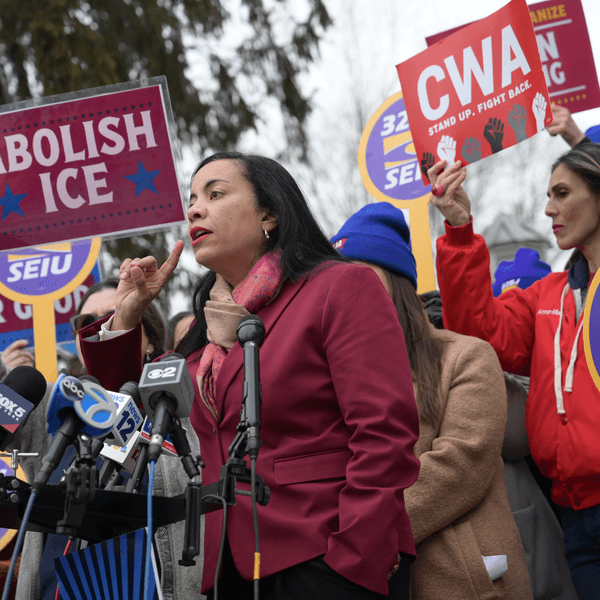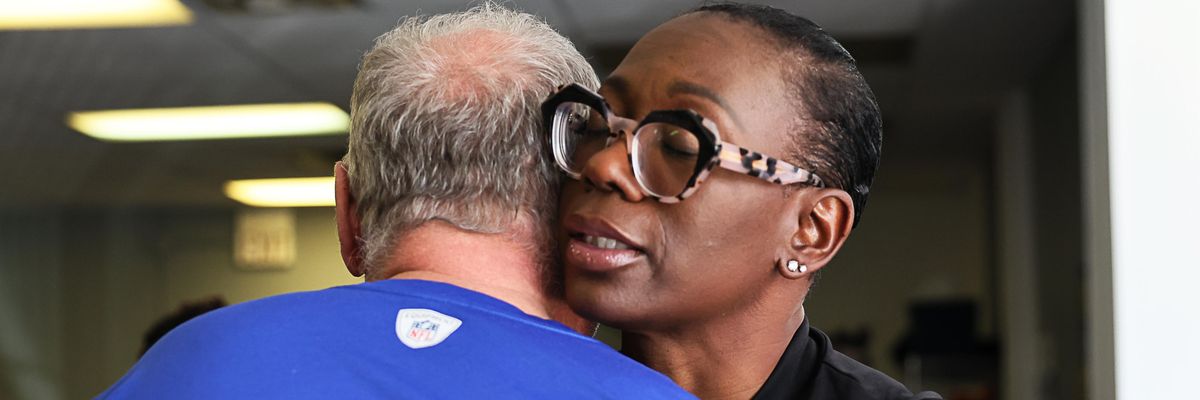The COVID-19 pandemic has revealed once again the awesome power of the Federal Government. Much as in 2008, when the U.S. and international financial systems imploded, the U.S. government and the Federal Reserve stepped in and took unprecedented measures to draw upon a seemingly unlimited pool of funds and bail out the existing economic order. Fortunately, these resources were extended more broadly this time, saving countless lives.
Nina Turner has long understood the power of government and politics to shape every aspect of our lives. A professor of American history, Turner fully understands how powerful and wealthy interests have dominated the U.S. system for decades, systematically perverting our democracy to their advantage in the process. And yet, the system isn't entirely closed off from popular influence. There are still elections. In theory, if enough honest advocates for the people can defy the odds, overcome all the barriers erected by the status quo to ensure their continual reign, they can win elections and even build a governing majority. Then they can pass legislation that actually serves the needs and interests of working people, the poor, communities of color and everyone who has been underserved throughout the nation's history, including these past four decades of renewed elite domination over our politics.
It's a long shot, but it's our best shot.
And the odds improve exponentially when a candidate is a spectacular communicator, who speaks in a popular vernacular, capable of connecting with people who have long felt alienated from a corrupt and unresponsive political system. Such a candidate will invariably champion specific legislation that would clearly improve the lives of most people, but will be opposed by the corrupt status quo, their wealthy backers and minions. Even more threatening to the entrenched interests is the fact that greater popular engagement with politics, a reinvigoration of democracy, is necessary to pass this and other popular legislation and, ultimately, build the framework for a society that serves the people and the planet instead of a de facto oligarchy and their business interests. The last thing elites want to see is the people practicing democracy. In the eyes of powerful elites, any candidate or politician who can spark such aspirations must--at all costs--be defeated.
Nina Turner is just such a candidate.
Of course, at the very time that Turner is attempting to defeat big money interests in Ohio-11, America is in the throes of a political crisis that threatens the democratic foundation of our society. One of our two national parties grows ever-more bold in its rejection of democratic norms as its leadership unabashedly prioritizes defeat of their opponents over all else. The Republican's refusal to accept the results of the last election led to a literal storming of the Capitol by party supporters, which party leaders now refuse to condemn.
And yet this party is favored to win the next round of national elections. How is that possible?
There are, of course, many factors contributing to this circumstance; but none bigger than how tens-upon-tens of millions of people across the country perceive the other party--the one that adheres to democratic norms, the one that prioritizes doing the work of government over partisan combat.
They feel it doesn't care about them; and it's not hard to see why.
If you look at the trajectory of American society over the past four decades, it's not a pretty picture. The once mighty middle class has been eviscerated. Following the housing market crash of 2008 and the great recession that followed, almost all social mobility disappeared with no signs of returning--and with it, the American dream, the prevailing myth of the society, evaporated.
What's left is a country rife with endemic social pathologies. If you remove the statistics that reflect aggregate wealth; America ranks at or near the bottom of virtually every social index when compared to other industrialized/high-tech countries--in health, diet, household debt, vacation time, crime, incarceration, drug addiction, education, poverty, homelessness, broken families, mental illness, access to healthcare, etc, etc. These problems are especially pronounced in small towns, rural America, and inner cities--but the prosperous cities on the coasts are increasingly unaffordable for workers too.
Overall, half the population lives in poverty or precarity; and most of the rest aren't far from the cliff. GDP and the stock market may be high, but all the gains go to the few.
How has the Democratic Party responded to this absurdly unjust set of social arrangements? With a few (far too few) notable exceptions, their approach can be described as technocratic management. More humane than the Republicans, they periodically attempt marginal improvements in between bouts of "necessary" austerity that, in turn, set everything back further than before; wash, rinse, repeat, privatize.
The long and short of it is this: through 16 years of the Clinton/Obama administrations nothing much was done to alter the downward trajectory for most Americans. In contrast, a lot was done to support the agenda of the biggest beneficiaries of the new age, the titans of finance and technology. And everybody saw this.
Fast forward to today, and while we have a Republican Party that's betraying the most sacrosanct principles of American government (which thrills its rabid base), the Democrats primarily rely on winning elections through fearmongering. While there is much to fear from the contemporary GOP, this is a terrible strategy when the other side's base is riled up; and, more significantly, it's predicated on the idea that the Democrats do not have the will to alter course and attempt to legislate a just and inclusive social contract into existence.
Nina Turner has the will to do all that. What's more, when she sets out to do it, there will be no confusion about what's transpiring. Not only is Turner one of the most committed politicians in the country to the plight of the dispossessed, the downwardly mobile, and to working class households; and to the people of her life-long hometown, Cleveland; she's also a great communicator who takes her message straight to the people.
Nina Turner understands that in a country as wealthy as ours, we have the resources to address every one of the endemic social pathologies catalogued above. If Nina Turner wins the Democratic primary for the open seat in Ohio's 11th congressional district on Tuesday, the American people are going to hear about how all the ills and imbalances of American society can and will be addressed--by the Democratic Party.
And this fact speaks to two paradoxes about this moment.
First, while it's true the Democrats have yet to pass their much-vaunted infrastructure package, and the public is showing signs of being restless (hence the decline in Democratic polling numbers); the proposed legislation, while not including everything a progressive like Nina Turner would want, would, if passed, represent a significant shift from the approach of the Clinton and Obama years. The two bills allocate spending that will create jobs and directly address the needs of poor and working Americans; and, if deemed successful, could auger a more permanent change in approach. However, compared to how FDR promoted the programs in his day--communicating directly to the people--the Democrats seem almost unwilling to promote what promises to be a package full of popular programs. They sure could use Nina Turner on their team.
Second, the Democratic Party establishment seems hellbent on keeping Nina Turner off their team. This is not surprising, given their anybody-but-Bernie approach to the 2020 primaries (and their consistent rejection of the left), but it will still be mighty tragic unless Nina triumphs on Tuesday.
How so? To begin, the reactionary anti-Turner Democrats risk alienating a huge group of politically energized young people. Bernie Sanders was the top choice for president by a landslide among Americans under thirty in both 2016 and 2020; and no one in Bernieland was more popular with the youth than the brilliant orator and 2020 campaign co-chair, Nina Turner.
These young progressives are savvy, and not predisposed to forgive a party they see as corrupt. It is not lost on them that Turner was poised to win this race in a landslide until an avalanche of money from conservative groups, and outright Republicans, poured into her opponents' coffers and saturated the district's airwaves with hit pieces on Nina. Nobody honestly believes these donations were made for any reason other than defeating Nina. What message does this send to idealistic young people? It's hard to imagine a more effective way of losing an essential demographic for next year's mid-terms and beyond. Hopefully the people of Ohio's 11th will save the Democrats from themselves by electing Nina on Tuesday.
Yes, indeed! After all, Nina and her legions of young supporters want nothing less than to transform the Democratic Party into what we desperately need in America: a party that addresses the needs of the people and the planet, proposes viable solutions for all of America's endemic pathologies, and puts us on a path towards a prosperous, inclusive middle class society with no poverty and no carbon emissions.
Until the Sanders campaign in 2016, the Democratic Party tacitly accepted the gross inequalities and injustices familiar to the American landscape. The party proposed no policies for their elimination. Similarly, the Democrats didn't push to end fossil fuel production, essentially disregarding the known science about the cause of the climate emergency.
Then a new dynamic entered the mainstream of American politics with the Sanders campaign, one that inspired a new generation to enter electoral politics. Perhaps no voice was more forthright and uplifting than a former State Senator from Ohio. Like the great freedom fighters from across history, she focused her audience on what needed to be remedied and inspired their belief that through collective action justice would triumph.
The opportunity seemed lost with Bernie's defeat in 2020 but then the pandemic forced a dramatic shift in the government's priorities, producing the largest state intervention in US economic history. Suddenly, progressive fiscal policy is an option again, for the first time in decades. This provides the Democratic Party with an unprecedented opportunity to redefine itself as a party committed to improving the lives of the vast majority of Americans--and build bonds of trust across the country that can overwhelm the GOP's assault on democracy.
But will the Democratic Members of Congress step up or step back?
We need members of Congress with the courage to buck the establishment and the inevitable neo-liberal naysayers, who are willing to go further than the current infrastructure bill and address the myriad problems facing the country, who can seize the moment and convey how progressive policies will put us on a path to a more just, prosperous, and democratic America.
We need Nina Turner in Congress!
As she likes to say: "Only all that we love is on the line!"




